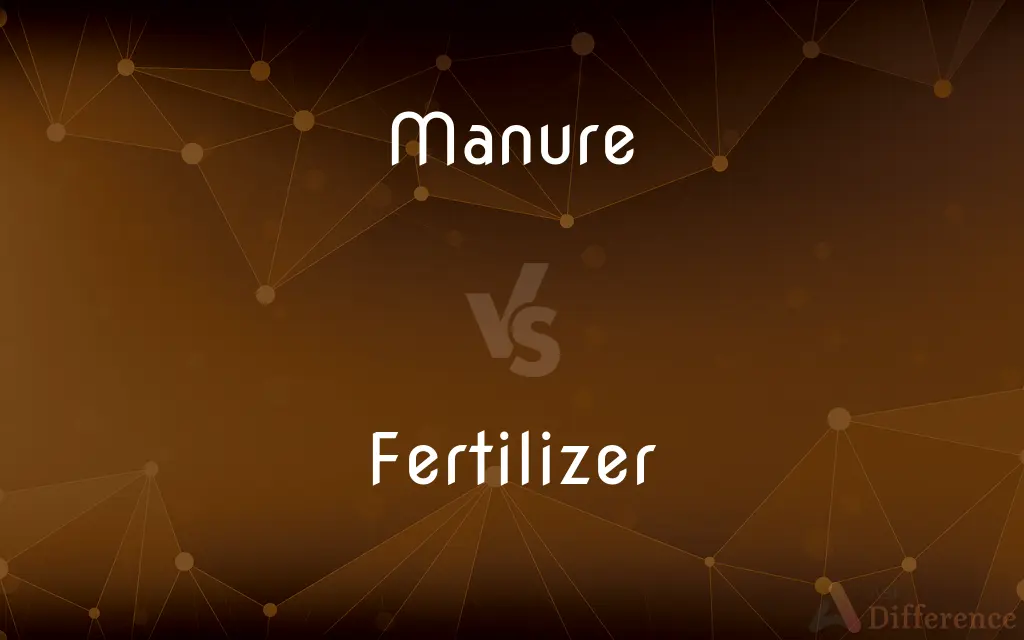Manure vs. Fertilizer — What's the Difference?
By Tayyaba Rehman & Urooj Arif — Updated on April 18, 2024
Manure is organic matter primarily derived from animal feces, used to enrich soil, while fertilizer is a chemical or natural substance added to soil to increase its fertility.

Difference Between Manure and Fertilizer
Table of Contents
ADVERTISEMENT
Key Differences
Manure is a natural, organic byproduct from animals that adds nutrients and improves soil structure. Fertilizer, however, can be either organic or inorganic, specifically formulated to provide particular nutrients to plants.
While manure releases nutrients slowly over time, enhancing soil health gradually, fertilizers typically offer a quick release of nutrients, directly targeting plant growth needs.
Manure generally contains lower nutrient levels compared to fertilizers, which are concentrated and can be tailored to provide specific ratios of nitrogen, phosphorus, and potassium.
The application of manure can improve the water retention capacity of the soil and increase microbial activity, enhancing soil fertility naturally. On the other hand, the use of fertilizers can sometimes lead to soil degradation and pollution if not managed properly.
Manure is often used as a cost-effective, environmentally friendly option particularly suitable for organic farming. Fertilizers, while effective for boosting crop yields quickly, require careful management to avoid environmental issues such as runoff and eutrophication.
ADVERTISEMENT
Comparison Chart
Source
Organic, from animal waste
Organic or inorganic chemicals
Nutrient Release
Slow and steady
Quick and targeted
Nutrient Concentration
Lower, varies widely
Higher, can be precisely formulated
Impact on Soil Health
Improves structure, water retention, and microbes
May degrade soil, risk of pollution
Typical Use
Organic farming, long-term soil health
Intensive agriculture, immediate growth needs
Compare with Definitions
Manure
A source of primary nutrients such as nitrogen, phosphorus, and potassium, although in varying amounts.
Manure from pigs is particularly rich in nitrogen.
Fertilizer
A chemical or natural substance added to soil or land to increase its fertility.
They applied nitrogen fertilizer to boost the wheat yield.
Manure
Decomposed organic matter primarily derived from animal feces used as fertilizer.
He spread cow manure in his garden to enrich the soil.
Fertilizer
Essential for high-yield agriculture where soil nutrient levels must be meticulously managed.
Modern agriculture relies heavily on synthetic fertilizers for maintaining high production rates.
Manure
A natural soil amendment that increases the organic content and fertility of the soil.
Adding manure helps to retain more water in sandy soils.
Fertilizer
Often used to provide a quick boost to plants, especially during critical growth phases.
Foliar fertilizers are sprayed directly on leaves for rapid absorption.
Manure
Material that is spread on or incorporated into soil to maintain or improve its fertility.
They used chicken manure to provide essential nutrients to their crops.
Fertilizer
Products that supply specific nutrients needed by plants, available in various forms like liquid, granular, or powder.
Soluble fertilizer is used for hydroponics systems where quick nutrient absorption is crucial.
Manure
An eco-friendly option for maintaining soil health and fertility.
Organic farms often prefer manure over synthetic fertilizers for environmental reasons.
Fertilizer
Can lead to environmental issues such as eutrophication if overused or improperly managed.
Overapplication of fertilizer led to runoff and pollution in the nearby lake.
Manure
Manure is organic matter that is used as organic fertilizer in agriculture. Most manure consists of animal feces; other sources include compost and green manure.
Fertilizer
A fertilizer (American English) or fertiliser (British English; see spelling differences) is any material of natural or synthetic origin that is applied to soil or to plant tissues to supply plant nutrients. Fertilizers may be distinct from liming materials or other non-nutrient soil amendments.
Manure
Animal dung used for fertilizing land
Plenty of fully rotted horse manure can be dug in this fall
Fertilizer
A chemical or natural substance added to soil or land to increase its fertility
Sewage sludge could be a valuable fertilizer for use in British forests
Manure
Apply manure to (land)
The ground should be well dug and manured
Fertilizer
Any of a large number of natural and synthetic materials, including manure and nitrogen, phosphorus, and potassium compounds, spread on or worked into soil to increase its capacity to support plant growth.
Manure
The dung of livestock or poultry.
Fertilizer
A natural substance that is used to make the ground more suitable for growing plants.
Manure
Such dung, or other organic or chemical material, used to fertilize soil.
Fertilizer
A chemical compound created to have the same effect.
Manure
To fertilize (soil) by applying material such as animal dung.
Fertilizer
One who fertilizes; the agent that carries the fertilizing principle, as a moth to an orchid.
Manure
To cultivate by manual labor; to till; hence, to develop by culture.
Fertilizer
That which renders fertile; a general name for commercial substances which make plants grow better, as manure, guano, phosphate of lime, ammonium nitrate, etc.
Manure
To apply manure (as fertilizer or soil improver).
The farmer manured his fallow field.
Fertilizer
Any substance such as manure or a mixture of nitrates used to make soil more fertile
Manure
Animal excrement, especially that of common domestic farm animals and when used as fertilizer. Generally speaking, from cows, horses, sheep, pigs and chickens.
Manure
Any fertilizing substance, whether of animal origin or not; fertiliser.
Manure
(euphemism) Rubbish; nonsense; bullshit.
Manure
To cultivate by manual labor; to till; hence, to develop by culture.
To whom we gave the strand for to manure.
Manure thyself then; to thyself be improved;And with vain, outward things be no more moved.
Manure
Any matter which makes land productive; a fertilizing substance.
Manure
Any animal or plant material used to fertilize land especially animal excreta usually with litter material
Manure
Spread manure, as for fertilization
Common Curiosities
Are there environmental concerns associated with fertilizers?
Yes, improper use of fertilizers can lead to soil degradation, water pollution, and eutrophication.
What is fertilizer?
Fertilizer is a substance added to soil to supply nutrients necessary for plant growth.
Can using manure benefit the soil in long-term?
Yes, manure enhances soil structure, increases microbial activity, and improves water retention.
What is manure?
Manure is organic matter from animal waste used to improve soil fertility.
How do manure and fertilizer differ in nutrient content?
Manure has lower, variable nutrient content while fertilizers are concentrated and can be tailored for specific nutrients.
Is manure considered organic?
Yes, manure is an organic substance and is widely used in organic farming.
What are the types of fertilizers available?
Fertilizers come in organic and inorganic forms, including granular, liquid, and soluble types.
How do manure and fertilizer affect water retention in soil?
Manure improves water retention, whereas excessive fertilizer use can sometimes reduce soil's ability to hold water.
What precautions should be taken when using manure or fertilizer?
Proper application rates and techniques should be followed to minimize environmental impact and maximize plant health.
Which is more cost-effective, manure or fertilizer?
Manure is generally more cost-effective and sustainable, especially for small-scale or organic farmers.
Why is it important to balance the use of manure and fertilizer?
Balancing both provides optimal nutrient availability, environmental sustainability, and soil health.
How often should manure be applied to the soil?
Manure should be applied based on the crop needs and soil condition, generally once or twice a year.
Can fertilizers be used in organic farming?
Organic fertilizers, yes, but synthetic chemical fertilizers are typically not permitted in organic farming.
Can manure supply all necessary nutrients to plants?
Manure provides essential nutrients but might not meet all specific nutrient requirements of certain crops.
What impact does fertilizer have on soil pH?
Some fertilizers can alter soil pH, requiring additional soil amendments to balance it.
Share Your Discovery

Previous Comparison
Copper vs. Brass
Next Comparison
Camel vs. DonkeyAuthor Spotlight
Written by
Tayyaba RehmanTayyaba Rehman is a distinguished writer, currently serving as a primary contributor to askdifference.com. As a researcher in semantics and etymology, Tayyaba's passion for the complexity of languages and their distinctions has found a perfect home on the platform. Tayyaba delves into the intricacies of language, distinguishing between commonly confused words and phrases, thereby providing clarity for readers worldwide.
Co-written by
Urooj ArifUrooj is a skilled content writer at Ask Difference, known for her exceptional ability to simplify complex topics into engaging and informative content. With a passion for research and a flair for clear, concise writing, she consistently delivers articles that resonate with our diverse audience.














































